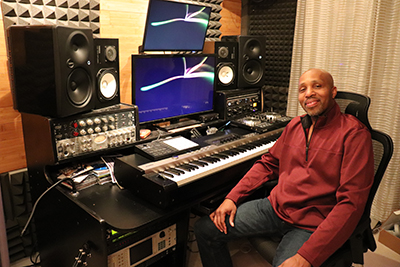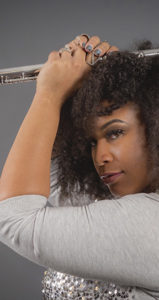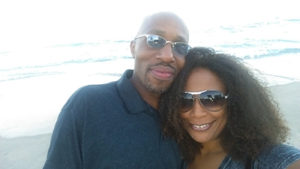
By Deon C. Jefferson

DCJ: Thank you for agreeing to do the interview. So, can you tell our readers a little about yourself and how you got started?
Dennis: Well, I grew up in Yonkers New York in an area named Colonial Heights. I got started in music very early on. My parents were the caretakers of an American Legion Hall. It kind of gave us access to a different way of growing up. They rented the place out for lots of parties and other functions. Back then, it was all about bands. Our living quarters were right behind the bandstand, so I would always peep out this little peep hole in the door when the place would be rented out for parties and watch these bands. So that’s kind of how I got “the bug” with music. Later on, in the years, bands started to get played out, so they started bringing in more DJ’s. When I got old enough in school I learned an instrument, I took up drums, we also had a piano where we lived so I always found myself playing it.
Ragan: Well, my up-bringing was not as interesting as Dennis’s was (laughs), but I grew up in Mount Vernon New York; it’s a city right next door to Yonkers. Some people would call Mount Vernon a suburb, but it’s not like the ones on tv. I grew up listening to a lot of music, there was always music being played in my house. My uncle was a singer in a doo wop group called the Cleftones. He really inspired me a lot, he was making records out of his house before it was popular. There was a drum set at his house that I would always play with. I just had this thing for music, so my parents just made sure I was always exposed to a lot of instruments. I  played the violin, drums, and the piano. One day there was this parade that went through the city, when I saw this parade, I had to be me apart. In the fourth grade when my band teacher came around, I said, “Ok, I’m going to play the drums’’. The band teacher said that there were not enough drums and all the boys wanted to play them, so I had to pick something else. I then wanted to play the trumpet, but they had no more left. At this point, I was fed up, so I said, “what do you have left”, he said the clarinet and flute. I really did not want to play the flute, but I took it anyway. It took me about a week to get a sound out of it. Once I did, it started to grow on me. Once I became good at it, I figured, I’d try to play jazz on it. My parents got me a private teacher, but he was not willing to let me start with jazz music. He wanted me to start with classical music. He wanted me to get my foundation first. I did not want to play classical music, but once I started to play, it grew in me. Then, I started winning classical competitions with my flute because I was writing and playing. I eventually went to a conservatory and studied music. Once I got to my senior year my heart was simply not in it anymore mainly due to the lack of pressure and the support. Partly because of how cutthroat the conservatories are. One day I was doing a concerto competition where I had to memorize a 20-minute piece and play it. Halfway through the piece, I forgot what I was supposed to be playing. They gave me the opportunity to start over and play from the beginning. I didn’t. Instead, I walked out and never looked back. After that I really did not have any idea what I would do with myself, so I went back home to New York. I visited this club called the August Blue light where Bob Baldwin was performing with about 12 people on stage. I went up to Bob after the set and told him I was a classical musician and I want to make the transition to jazz. I asked him for some tips. When he mentioned that he was doing a jingle for a commercial station in a few weeks and asked if I wanted to stop by. A few weeks later I got to the studio and Dennis answered the door. I had no idea it was his studio, so that’s actually where we meet for the first time. From that point Bob took me under his wing so I could make the transition from classical to jazz. Dennis taught me everything about the studio and how to create music with computers. The rest is history.
played the violin, drums, and the piano. One day there was this parade that went through the city, when I saw this parade, I had to be me apart. In the fourth grade when my band teacher came around, I said, “Ok, I’m going to play the drums’’. The band teacher said that there were not enough drums and all the boys wanted to play them, so I had to pick something else. I then wanted to play the trumpet, but they had no more left. At this point, I was fed up, so I said, “what do you have left”, he said the clarinet and flute. I really did not want to play the flute, but I took it anyway. It took me about a week to get a sound out of it. Once I did, it started to grow on me. Once I became good at it, I figured, I’d try to play jazz on it. My parents got me a private teacher, but he was not willing to let me start with jazz music. He wanted me to start with classical music. He wanted me to get my foundation first. I did not want to play classical music, but once I started to play, it grew in me. Then, I started winning classical competitions with my flute because I was writing and playing. I eventually went to a conservatory and studied music. Once I got to my senior year my heart was simply not in it anymore mainly due to the lack of pressure and the support. Partly because of how cutthroat the conservatories are. One day I was doing a concerto competition where I had to memorize a 20-minute piece and play it. Halfway through the piece, I forgot what I was supposed to be playing. They gave me the opportunity to start over and play from the beginning. I didn’t. Instead, I walked out and never looked back. After that I really did not have any idea what I would do with myself, so I went back home to New York. I visited this club called the August Blue light where Bob Baldwin was performing with about 12 people on stage. I went up to Bob after the set and told him I was a classical musician and I want to make the transition to jazz. I asked him for some tips. When he mentioned that he was doing a jingle for a commercial station in a few weeks and asked if I wanted to stop by. A few weeks later I got to the studio and Dennis answered the door. I had no idea it was his studio, so that’s actually where we meet for the first time. From that point Bob took me under his wing so I could make the transition from classical to jazz. Dennis taught me everything about the studio and how to create music with computers. The rest is history.
DCJ: Who are some of the people that have influenced you musically; they can be dead or alive?
Dennis: It’s a lot for me. Anyone from Earth Wind and Fire, Stevie Wonder, Micheal McDonald, The Dube Brothers, Parliament Funkadelic, Steely Dan (laughs). My list could go on and on.
DCJ: Speaking of EWF, did you know that they are having a versus battle with The Isley Brothers?
Dennis: Wow! We had no idea! I’m definitely watching that one! Thanks for telling me that.
DCJ: (Laughs) No problem!
Ragan: It’s aloft for me too. As far as a performer standpoint, I love Kathleen Battle, Jesse Norman, Ella Fitzgerald, Herbie Hancock, and also Tina Turner.
DCJ: Since you guys nam-ed your influences, I want to know about one of your most memorable experiences. Was it a new song? Was it a specific performance? Was it winning a prestigious award? Tell me about your most memorable experience.
Ragan: Mine would be the time I played with Dave Valentine. He passed away about 5 years ago. He was a legendary Lantin jazz Flautist. He is Mr. Bronx. He grew up playing with Tito Punete and pretty much all the Latin jazz musicians. He’s won a Latin jazz Grammy, so he is a big deal. I was doing this gig with Bo d(Baldwin) in New Jersey. Dave Valentine had done his set before mine, so he was packing up his flute getting ready to go. We had just started our set, I’m soloing, and when I solo I close my eyes. I was looking over at Bob to let him know I was finished, then all of a sudden he pointed to the other side of the stage. I then turn around and see Dave Valentine coming on stage putting his flute together. It was a lot of fun. It almost felt like he was passing the torch. It was one of his last gigs before he passed away. I’ve had a lot of memorable experiences, that one is probably the best.
Dennis: Well, nobody is ever asked me that one before. I was never really a performer; I was basically the man behind the scenes. I can remember being eighteen years old and making my first record ever in a recording studio. I made a rap record because I was a DJ in rap group The Vicious Rumor Club. We did the rap version of a song from back in the day called “Rumors” by The Timex Social Club. It was considered a spinoff or a novelty record. It came out shortly after their record came out (Social Club). That experience was one of my top highlights in my career, but another one was hearing my song play on the radio for the first time. Now, that’s one of the most incredible feelings in the world. It never gets old!
DCJ: (Laughs) That’s amazing! I can only imagine the feeling. Now, 2020 was a tough year across the board. What were you all doing during the lockdown to sharpen your as creatives?
Ragan: We have a three-year-old and a five-year-old. So, most of our lives were centered around them. We spent a lot of time figuring out how we can record after they go to sleep. It was serious exercise and time management (Laughs). It was cool when they had school, but once we had to do it from home, it was hard to figure out. After a while they got used to it and they stopped bugging us for snacks, they understood when mommy was practicing the flute, in the other room or when they saw daddy working in the studio. I also took the time to get back to basics. I bought a new flute. When you get a new instrument, you have to break it in, and you have to learn it. I pulled out all my stuff from the conservatory days and just kinda brushed up on my skills a little bit.
Dennis: For me, I did a lot of work in my studio. I replaced a lot of the technology. You know the old saying, “Out with the old, In with the new”. Just really digging deeper into my craft as far as mising goes. I also purchased new plugins for mixing. We also write a lot too. She (Ragan) bought me a ukulele for Father’s Day last year. I learned how to play it by watching YouTube videos.
DCJ: Did you all work on any new projects?
Ragan: We actually did release an album last year called “Five Up Top”. It was an EP, our intention was for it to be a full album, but Covid happen. We were determined to get something out. We have another project coming out and we’re dropping the single at the end of May.
DCJ: What advice would you give your younger self about entering the music industry?
Dennis: Hmmm, I’d probably say “Don’t quit your day job” (Laughs). On a more serious note, It’s such a different industry now. We’re living in the era of the “independent artists”. We always tell people that the good news is that anybody can make a record out of their house, and the bad news is anybody can make a record out of the house now. We tell folks to learn your craft. Stick to it. Hold on to your master’s and dont sell them. It’s more than just making a beat. You have to learn everything.
Ragan: Make sure you find some mentors. Not necessarily sponsors, but people who are going to talk about you in a positive way to decision makers when you are not in the room.
DCJ: Ragan, jazz is a male dominated industry. What challenges have you faced in the industry with being a woman?
Ragan: I would probably say I face issues when it comes to the lineups for festivals and smaller series. They are still very male dominated. Dare I say, “sausage fest”. There’s one festival that had something like 22 artists over a few days and only two of them were women. We need diverse lineups. It’s not also supposed to be about the dudes. I haven’t really seen anything else outside of that, but the overall one is the lineups.
DCJ: You’ve worked with people like Celine Dion, Melba Moore, Freddie Jackson, and Avril Levine. How have you managed to work with so many diverse people?
Dennis: I’ve always had the ability to do any genre of music within reason. I started out as a hip-hop guy, then I morphed into being into the R&Bx thing. I also did the house thing, and the pop and rock thing. I’ve touched on almost every genre, and I’ve always taken pride in being able to do that. I really love music and I just love wrapping myself up in whatever genre floats my boat that day. My favorite songs to do are rock records. People look at my crazy, but they are some of the most fun records to do.
DCJ: Ok, so you guys have been married for 10 years now. You guys work together, live together, and have two kids? What’s the secret to your marriage?
Ragan: “Happy Wife, Happy Life” (Laughs)
Dennis: I try to keep the peace! (Laughs)
Ragan: No, seriously. We were friends a long time before we started dating or even got married. We waited a long time because he made me chase him! (Laughs). Our friendship is the foundation of everything. That has a lot to do with our marriage. We just know each other so well. Together it’s been about 20 years.
DCJ: So, what’s new? Rell our readers what you have coming up next.
Dennis: We have a record label called Randis music, we’ve been putting out Ragan’s music out on it since the first album. We are looking to expand the label and sign some more artists. Next single coming out in May. New Album coming out at the end of this year. I’m still writing and producing for other people. Working on film and television with some music placements.
Well, I thank you so much for your time, and we look forward to supporting the new album and single. God Bless take care.


Be the first to comment